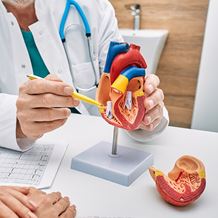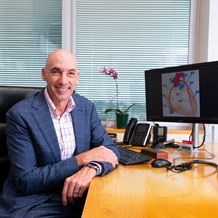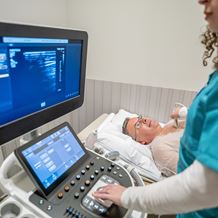What is cardiomyopathy?
Cardiomyopathy refers to an abnormality of the heart muscle which prevents it from working effectively. In some cases, it can also disturb the heart rhythm. There are four main types of cardiopathy which can affect the heart muscle in a variety of ways.
- Dilated cardiopathy – This is the most common type of cardiomyopathy. The heart becomes enlarged and stretched, making it too weak to work normally.
- Hypertrophic cardiomyopathy – This complex condition occurs when part of the heart thickens and restricts blood flow to the rest of the body.
- Restrictive cardiomyopathy – This occurs when some of the heart muscle stiffens and is unable to fill with blood and work efficiently.
- Arrhythmogenic right ventricular dysplasia – This unusual type of cardiomyopathy occurs when part of your heart muscle is replaced by scar tissue that disrupts the natural heart pattern. It can be fatal in young adults.
When the heart is unable to pump enough blood to the rest of your body as a result of cardiomyopathy, over time this can weaken the muscle and lead to heart failure.
Symptoms and causes
Cardiomyopathy symptoms can be very similar, ranging from none at all in the early stages, through to weakness, dizziness, shortness of breath, high blood pressure, swelling, rapid heartbeat and fatigue. They can worsen quickly without treatment. There are multiple causes of cardiomyopathy including blocked heart arteries, or genetically inherited issues with the heart muscle, such as idiopathic dilated cardiomyopathy, and hypertrophic cardiomyopathy. The cause cannot always be identified, and the condition can affect anyone of any age, race, or sex.
How is it diagnosed?
As the heart-related symptoms are quite wide reaching, your doctor may refer you onwards to a cardiologist for further examination. Specific diagnostic tests and procedures are available to examine the efficiency of your blood flow and help diagnose cardiomyopathy such as:
How is it treated?
Cardiomyopathy is typically a progressive condition, so the goal of any treatment is to manage the symptoms and help your heart work as efficiently as possible. The treatment pathway will vary depending on the severity of the condition. In the first instance, your doctor may advise lifestyle changes such as diet and exercise as this can significantly help to strengthen your heart and slow the onset of the disease. There is also medication available to help manage high blood pressure and reduce inflammation. Some patients will benefit from an implantable device such as a pacemaker or defibrillator, and in more severe cases, surgery may be recommended such as a coronary artery bypass. Cardiac rehabilitation and exercise are critical to managing cardiomyopathy.

Other conditions
What's next?
If you have been experiencing heart-related symptoms, book an appointment with our cardiac services specialist today.
Our specialists in Cardiac Services
View all specialists





